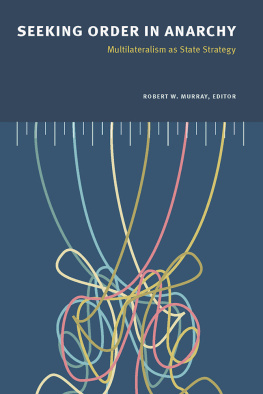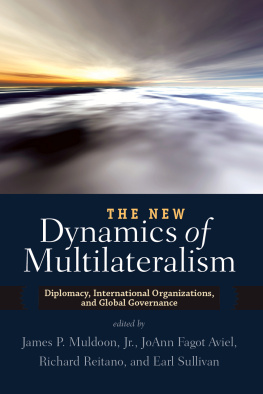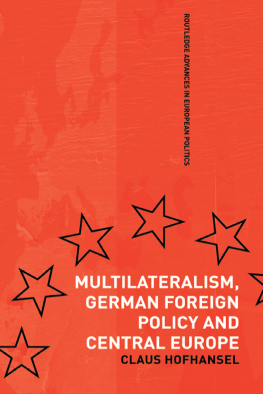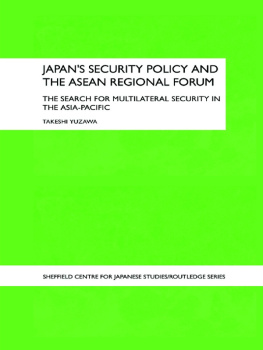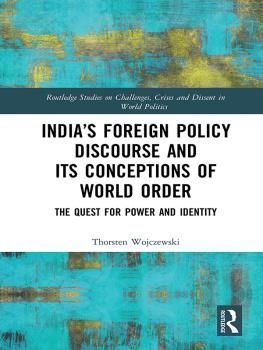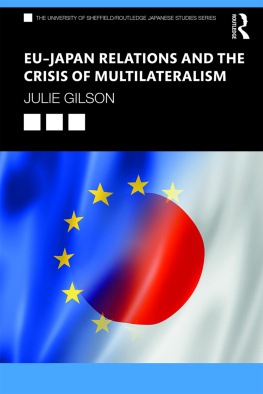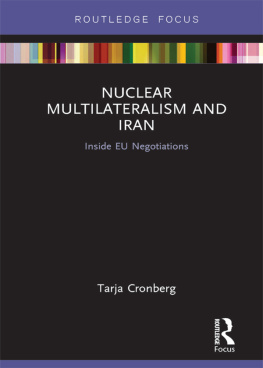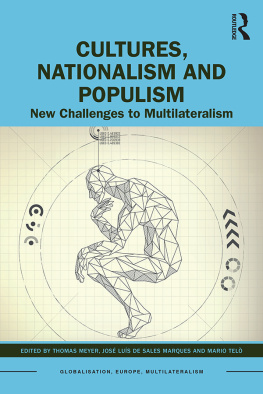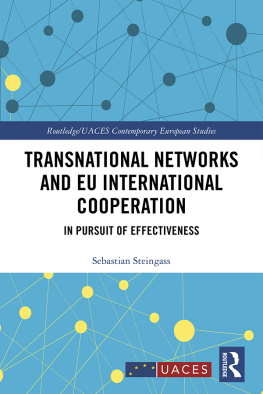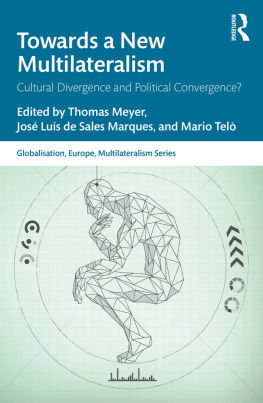Published by
THE UNIVERSITY OF ALBERTA PRESS
Ring House 2
Edmonton, Alberta, Canada
T6G 2E1
www.uap.ualberta.ca
Copyright 2016 The University of Alberta Press
LIBRARY AND ARCHIVES CANADA CATALOGUING IN PUBLICATION
Seeking order in anarchy : multilateralism as state strategy / Robert W. Murray, editor. Includes bibliographical references and index. Issued in print and electronic formats.
ISBN 978-1-77212-139-1 (paperback). ISBN 978-1-77212-278-7 (epub). ISBN 978-1-77212-279-4 (mobipocket). ISBN 978-1-77212-280-0 (pdf)
1. International relationsCase studies. 2. World politics21st centuryCase studies. I. Murray, Robert W., 1983, author, editor
| JZ1305.S43 2016 | 327.101 | C2016-902866-6 |
| C2016-902867-4 |
First edition, first printing, 2016.
First electronic edition, 2016.
Digital conversion by Transforma Pvt. Ltd.
Copyediting and proofreading by Joanne Muzak.
Indexing by Adrian Mather.
Cover design by Virginia Penny.
All rights reserved. No part of this publication may be reproduced, stored in a retrieval system, or transmitted in any form or by any means (electronic, mechanical, photocopying, recording, or otherwise) without prior written consent. Contact the University of Alberta Press for further details.
The University of Alberta Press supports copyright. Copyright fuels creativity, encourages diverse voices, promotes free speech, and creates a vibrant culture. Thank you for buying an authorized edition of this book and for complying with the copyright laws by not reproducing, scanning, or distributing any part of it in any form without permission. You are supporting writers and allowing University of Alberta Press to continue to publish books for every reader.
The University of Alberta Press gratefully acknowledges the support received for its publishing program from the Government of Canada, the Canada Council for the Arts, and the Government of Alberta through the Alberta Media Fund.
This book is dedicated to a distinguished scholar, a great mentor,
and a fierce friendProfessor Tom Keating.
CONTENTS
Two Types of Multilateralism
Antonio Franceschet
The English School, Ipe, and Postwar Multilateralism
Greg J. Anderson
A View from the English School
Matthew S. Weinert
Co-operation in the Emerging Multipolar System
Robert W. Murray
Contract or Covenant?
Paul Gecelovsky
Romanticism with Conservative Characteristics
Kim Richard Nossal
The United Nations in the Clinton Era
Francis Kofi Abiew
A Long View
Christopher J. Kukucha
How Western Aggression Created the Russia Problem
Shaun Narine
The Case of CanadaSouth Africa Relations
David R. Black and David J. Hornsby
The United Nations Approach to Terrorism in a Post-9/11 World
John McCoy
A Rebuttal to Keatings Twilight of Canadian Multilateralism
Duane Bratt
The Chrtien and Harper Eras
Edward Ansah Akuffo
Reconciling the Idea and Practice of Multilateralism
Tom Keating
ACKNOWLEDGEMENTS
The idea for this book began the moment that Tom Keating informed me that he was retiring after a distinguished academic and teaching career at the University of Alberta. It has been a great challenge, determining how to best reflect on the contributions of one of the most important scholars of foreign policy and multilateralism in Canada. The level of support from this world-class group of contributors was overwhelming from the start, and their dedication to the project, their excellent contributions, and patience with a determined editor are very much appreciated. I owe a profound word of thanks to the team at the University of Alberta Press, especially Linda Cameron, whose support from the very first time I sat in their offices and pitched this idea was amazing. Thanks are also owed to the Department of Political Science and the Faculty of Arts at the University of Alberta, both of which showed interest from the outset in how this project evolved. I am grateful to my colleagues at the Frontier Centre for Public Policy for their encouragement throughout this process, with special thanks to Brianna Heinrichs and Matthew Sinclair for their help in preparing the final manuscript.
On a more personal level, I am eternally grateful to my family, friends, and colleagues who stood with me throughout the various stages of this project and supported, without hesitation, what I was aiming to do.
Last, but certainly not least, I owe thanks to Tom Keating for so very much, including for inspiring me and all of the others included in this volume.
RWM
Edmonton, AB
INTRODUCTION
Robert W. Murray
Relatively recent developments have changed popular perceptions of the long-term goal of multilateralism. In the past, many saw the eventual goal as world government, the replication of state-level institutions at the international level. But increasingly the present multilateral process is referred to as global governance, with governance referring to governing styles in which boundaries between and within public and private sectors have become blurred. Furthermore, many observers now tend to perceive present global governance as a laboratory in which a unique form of governance is being created for the world. Virtually all of the worlds peoplesas a result of what they consume and the air that they breathelive their daily lives linked to others around the world. Given the push and pull that they themselves exert on this web of connections and their own personal stake in the global good, citizens should be empowered to understand the nature of evolving multilateralism.
Chadwick F. Alger, Widening Participation
Throughout the history of both the study and practice of international politics, the influence of multilateralism has been a consistent theme. While scholars diverge on the primary actors in global affairs, typically debating the centrality of the state versus the influence of the global citizenry on outcomes, the impact and role of international institutions are seen as incredibly important in the overarching international political framework. Whether these institutions are perceived to be forums for great powers to exercise their influence over smaller powers, or whether they are seen as bodies responsible for the articulation and enforcement of international law, the governance framework of an increasingly complex international order becomes ever more essential to note and understand. This understanding, however, is no simple task given the proliferation of international institutions in recent years and questions surrounding just how to measure effectiveness and importance of organizational frameworks.
There are a variety of reasons for this lack of appreciation for, and scholarly attention to, multilateralism, though none sufficiently explains this issue and its consequences for how this might impact our understanding of international politics on its own.
The first problem with understanding both global governance and multilateralism is that there is no singular theory of co-operation and diplomacy in international relations. Various theoretical approaches discuss multilateralism and the role of institutions, but there is little agreement between the practitioners of these schools of thought about the basic tenets of multilateralisms role in international affairs. For instance, realism contends that institutions are important for great powers to legitimize their behaviour and to intimidate, coerce, and compel other states to act in particular ways in certain circumstances; liberalism argues quite the opposite, and sees institutions as vital for the development and enforcement of international law and rights on behalf of domestic populations; constructivism focuses on the role of norms in forming institutions and in defining their purpose; the English School discusses institutions as primarily responsible for implementing and protecting a normative framework in an effort to strive for and safeguard international order; and other critical theories take aspects of the global governance framework as needed to explore questions of power, domination, inequality, emancipation, and so on. In all, while virtually all theoretical approaches to international relations have expended some effort on studying governance and institutions, few have probed deeply enough to convincingly answer key questions about the role of these institutions in international affairs.

